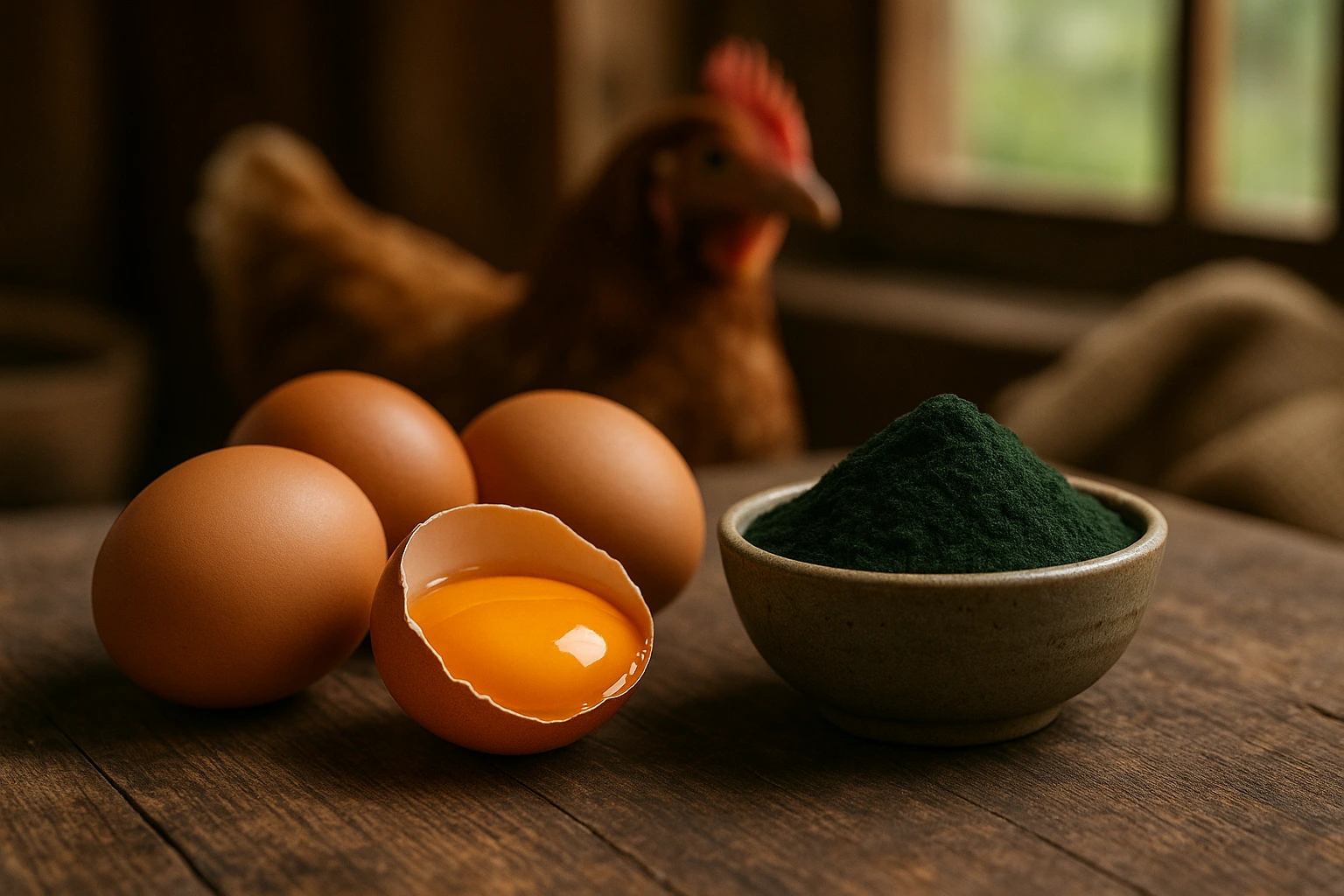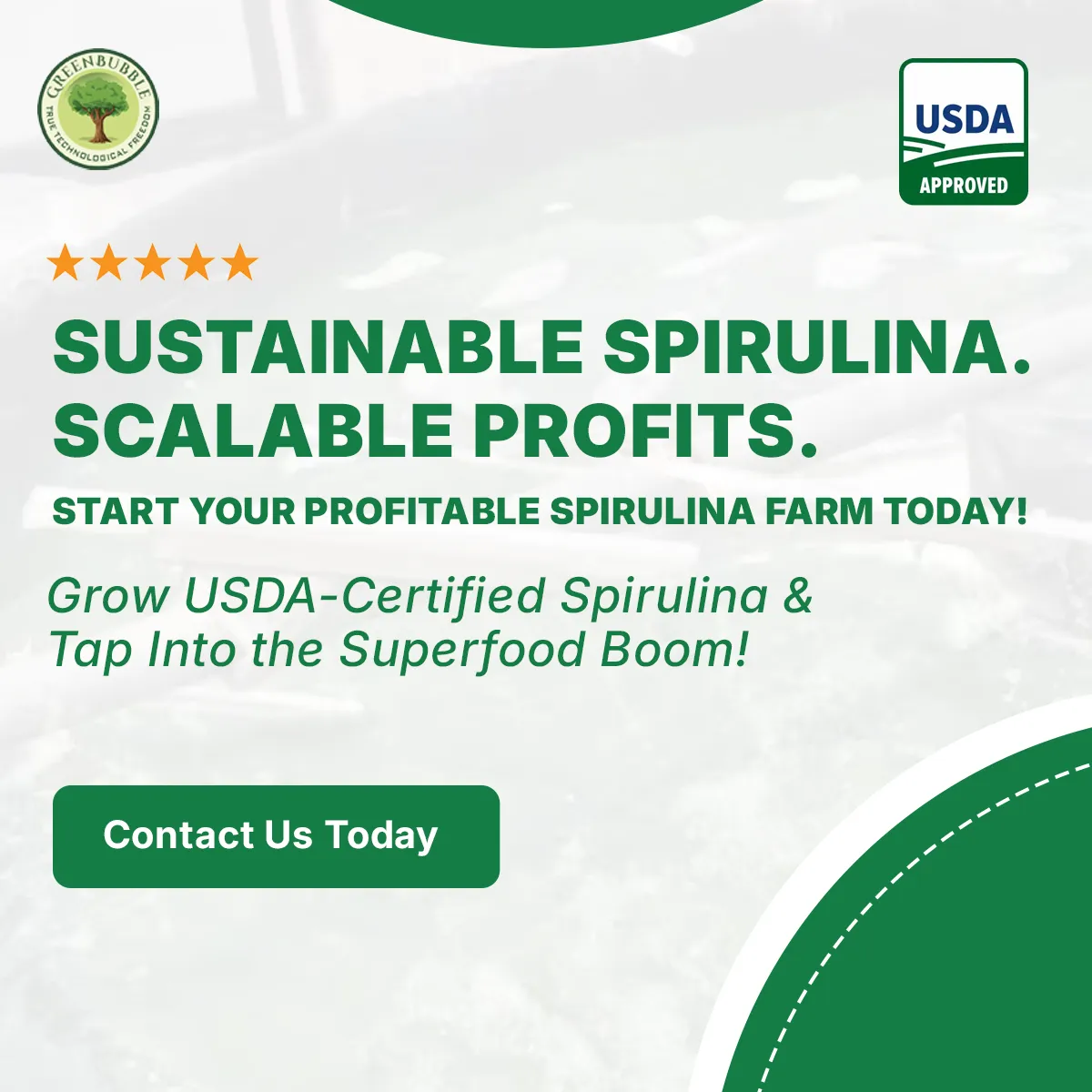Introduction
Spirulina, a blue-green microalgae, has long been celebrated as a superfood for humans. But in recent years, it has gained equal attention in the world of animal husbandry and aquaculture. From poultry farms to cattle rearing and even fish culture, spirulina is increasingly being recognized as a natural, nutrient-rich supplement for animal feed. Its exceptional protein content, bioactive compounds, and immunity-boosting properties make it a sustainable and profitable choice for feed manufacturers and farmers alike.
With the global push toward organic and chemical-free farming, spirulina is poised to become a cornerstone ingredient in animal feed formulations. Let’s explore why.
Why Spirulina in Animal Feed?
Spirulina isn’t just another supplement – it’s a powerhouse of nutrition. Its profile includes:
- Protein: 55–70% by dry weight – a complete protein with all essential amino acids.
- Fatty acids: Includes gamma-linolenic acid (GLA), linoleic acid, and omega-3 & omega-6 fatty acids.
- Vitamins: B1, B2, B6, B12, C, D, and E.
- Minerals: Iron, calcium, potassium, magnesium, selenium, and zinc.
- Pigments: Phycocyanin and β-carotene, known for antioxidant and immunity-enhancing effects.
These nutrients not only support the health of animals but also improve feed conversion ratios, productivity, and product quality (like eggs, milk, or meat).
Spirulina for Poultry
One of the most widely researched applications of spirulina is in poultry nutrition. Studies and trials highlight:
- Egg yolk pigmentation: Adding just 1% spirulina to poultry diets significantly enhances yolk color, giving it a rich golden hue desired by consumers.
- Egg quality: Spirulina improves shell thickness and albumen quality.
- Immunity boost: Laying hens fed spirulina showed reduced infection rates due to its bioactive compounds.
- Reduced need for synthetic additives: Farmers can cut back on artificial pigments and antibiotics.
This makes spirulina an ideal natural supplement for both layer and broiler poultry farms.
Spirulina for Livestock & Aquaculture
Cattle, Goats, and Pigs
- Improves milk yield and quality in dairy cattle.
- Supports muscle growth and weight gain in goats and pigs.
- Reduces methane emissions in cattle by improving gut health.
Aquaculture
- Spirulina is a natural feed additive for fish, shrimp, and ornamental species.
- Enhances growth rates and feed efficiency.
- Improves survival rates by boosting immunity.
- Enhances skin and flesh pigmentation in ornamental fish and prawns.
These advantages make spirulina one of the best sustainable replacements for fishmeal, which is costly and environmentally unsustainable.
Scientific Insights & Nutrient Profile
Spirulina has an edge over traditional feed additives:
- High digestibility: Animals absorb spirulina nutrients better than many plant-based feed alternatives.
- Feed conversion efficiency: Improved protein utilization leads to faster growth.
- Pigments & antioxidants: Phycocyanin and β-carotene help fight oxidative stress and infections.
- Nutrient density: Spirulina delivers concentrated nutrition in small doses, reducing bulk feed requirements.
Organic & Sustainable Advantage
In organic and antibiotic-free farming, spirulina plays a vital role:
- No synthetic chemicals: Nutrient inputs for spirulina cultivation must meet organic standards.
- Reduced antibiotics: Spirulina boosts immunity naturally, lowering the need for synthetic drugs.
- Sustainable farming: It requires less land and water than soy or corn feed.
- Circular economy: Spirulina farms can integrate with livestock systems to recycle water and nutrients.
For deeper insights, see Spirulina Farming as a Sustainable Business.
Challenges & Considerations
While spirulina is highly beneficial, farmers should be mindful of certain challenges:
- Cost factor: Spirulina is more expensive than conventional feed additives. Large-scale adoption depends on reducing production costs.
- Quality assurance: Contamination-free production is vital for animal health. Learn more in Spirulina Quality Control in Mass Production.
- Certification requirements: Organic livestock farms must ensure spirulina sources are USDA/EU Organic certified.
- Supply chain: Scaling production to meet demand requires automation and strict monitoring systems.
Market & Business Opportunities
The animal feed industry is witnessing a major shift toward natural supplements. Key opportunities include:
- Poultry feed supplements: Demand for natural yolk pigments and immunity boosters.
- Livestock health products: Growing preference for chemical-free growth promoters.
- Aquaculture feed: Rising fish and shrimp farming industries worldwide.
- Premium markets: Certified organic feed fetches higher prices in Europe and North America.
For a deeper dive into profitability, read Economic Viability of Large-Scale Spirulina Production.
Interlinked Best Practices
For consistent quality and yield, farmers should also follow Spirulina Cultivation Best Practices. These practices ensure the spirulina used in animal feed remains nutrient-dense and contamination-free.
FAQs
1. How much Spirulina should be added to poultry feed?
A recommended dosage is around 1% of the poultry diet, which improves egg yolk pigmentation and overall hen health.
2. Is Spirulina safe for cattle and goats?
Yes, spirulina is safe and effective for ruminants. It enhances milk yield and improves animal immunity without harmful side effects.
3. Can Spirulina replace fishmeal in aquaculture feed?
Spirulina is one of the best natural alternatives to fishmeal. It supports fast growth, better survival rates, and pigmentation in fish and shrimp.
4. Is Spirulina-certified feed more profitable in the market?
Yes. Certified organic spirulina feed products command premium pricing in global markets, making them attractive for farmers targeting exports.
Conclusion
Spirulina is more than just a superfood for humans-it’s a game-changer in the animal feed industry. From poultry and cattle to fish and shrimp, its unmatched nutritional profile, immunity-boosting properties, and sustainable cultivation methods make it the future of livestock nutrition. While challenges such as cost and certification remain, the market opportunities far outweigh them. Farmers and businesses that adopt spirulina in feed formulations stand to benefit from healthier animals, better products, and strong market demand.


